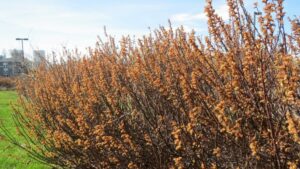
Executive Director
Canadian Seed Institute
The Canadian Seed Institute tries to think outside the box in everything we do, expanding our influence beyond just the traditional seed industry. We managed to recently do that again with a new program delivered to the Canadian Nursery Landscape Association (CNLA).
CNLA’s members, nurseries in southern Ontario in particular, are being impacted by the reality that boxwood blight — a fungal disease affecting boxwood plants — is not a regulated pest in Canada. It is, however, a regulated pest in Pennsylvania and Tennessee. Without a proper phytosanitary certification program that would could allow them to ship boxwood species into those two U.S. states, Canadian nurseries would lose access to an important U.S. market since.
CNLA has been working to develop a phytosanitary certification program but was having trouble finding a partner interested in developing a program for a pest that was not regulated in Canada.
CNLA reached out to CSI in late July 2018 to see if we could work with them to establish a new phytosanitary certification program (a pest-specific program) for boxwood blight. We agreed to assist CNLA since we could easily adapt the existing Clean Plants program to include this pest-specific certification.
Following our initial discussion with them, CNLA proposed to Pennsylvania and Tennessee that CNLA adopt Oregon’s boxwood blight certification program. They would use CSI as their audit body, just as they have done in their other phytosanitary programs. CNLA’s hope was that this would be acceptable to Pennsylvania and Tennessee and these two states would open their doors to certified Canadian nurseries.
Pennsylvania and Tennessee accepted the proposal and CSI and CNLA were able to adapt the current nursery phytosanitary program audit processes to add boxwood blight on as an additional CNLA audit and certification program for boxwood blight. CNLA expected there would be about two to three nurseries in Ontario to start. It is not a high-volume program with respect to the number of nurseries participating in the program, but it is an extremely valuable business to those nurseries involved.
“We were confident that all our boxwood was free of boxwood blight through accredited third-party testing and a strict set of biosecurity protocols that were closely aligned with the Clean Plants program. Pursuing certification was a logical next step when the quarantine was put in place by Pennsylvania (2016) and Tennessee (2018),” says Peter Krawiec, quality control supervisor for Sheridan Nurseries in Georgetown, Ont.
“The USDA and CFIA were not regulating boxwood blight, meaning CFIA was unable to certify our product to help us get through the quarantine. Knowing the Canadian Nursery Certification Institute already had the Clean Plants Program in place, we reached out to the CNLA, who initiated discussions with the respective departments of agriculture on behalf of the Canadian nursery and landscape industry.”
Understanding the value of the program, Sheridan Nurseries started the implementation of the certification process, Peter says.
“Due to the strict protocols already in place at Sheridan Nurseries, it was a simple matter of re-writing them to match the outline of the Nursery Manual for the application process. The most difficult part of the process was looking at our protocols through the eyes of an auditor. The whole program being second nature to us, there were steps that we had to expand upon to make sense to a third party.
“It was through this process that we were able to enhance areas of our program that we found to be lacking. Through the pursuance of certification and the third-party auditor validation of the effectiveness of our protocols, we were able to improve upon our already strict biosecurity program and have reassured our guests that they can confidently purchase our boxwood knowing it is disease-free.”













